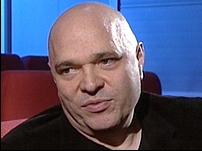Anthony Minghella (January 6, 1954 — March 18, 2008) was an Academy Award-winning English film director, playwright and screenwriter. He was Chairman of the Board of Governors at the British Film Institute between 2003 and 2007.
I would like to start this article by showing you the interview that I held with the director on the 28th of October 2006. It was on the red carpet of The London Film Festival for the presentation of one of his last productions “Breaking and Entering”. This is a link to a Luca Aquilanti’s video.
I would like to start this article by showing you the interview that I held with the director on the 28th of October 2006. It was on the red carpet of The London Film Festival for the presentation of one of his last productions “Breaking and Entering”. This is a link to a Luca Aquilanti’s video.
At the time of interview, I was really impressed by all the enthusiasm that Anthony had and each answer was like a cinema lesson. I asked him if he was planning to release a movie in Italy and he answered me that he would love to. He received the title of “Commendatore” (an important Italian honor granted from the President of the the Italian Republic.
Minghella was born in Ryde, on the Isle of Wight, the son of Gloria and Edward Minghella, ice cream factory owners.[1] His father was Italian/Scottish and his mother came from Leeds; her ancestors originally came from Valvori, a small village in the Lazio region of central Italy. Minghella attended Sandown Grammar School and St John’s College in Portsmouth. He was a graduate of the University of Hull, where he completed undergraduate and postgraduate courses, but eventually abandoned his doctoral thesis.
He is Italian blood and we can consider him a progeny of the Italian Romanticism for his visual art. Anthony Minghella became best-known as a director, but he was first and foremost a writer.
He died at the age of 54, with only seven features to his credit, including The English Patient, The Talented Mr. Ripley and Cold Mountain. Minghella had so much more to show us about ourselves and the curves life throws at us.
In 1996, he won the Academy Award for Directing for The English Patient. He was nominated for the Academy Award for Adapted Screenplay for 1999’s The Talented Mr. Ripley.
I would like to conclude this article with some words from the director that could inspire the youth of today to become a great film director:
AM: “I became interested in writing by a circuitous route. As a teenager I was obsessed with music and with writing and performing songs. Throughout my university course I continued to write music and lyrics, often for plays being produced in the university’s Drama department, which was my undergraduate center. In my final year I threaded a group of songs together into a kind of musical with some dialog embroidering and contextualizing each number. A local playwright, Alan Plater, saw the resulting event and called me and asked me in his capacity of chairman of the theater company based in the city, whether I’d like to write them a play. Up until that moment I’d never imagined being a dramatist. But I wrote the play and stumbled into a career”.
Minghella was born in Ryde, on the Isle of Wight, the son of Gloria and Edward Minghella, ice cream factory owners.[1] His father was Italian/Scottish and his mother came from Leeds; her ancestors originally came from Valvori, a small village in the Lazio region of central Italy. Minghella attended Sandown Grammar School and St John’s College in Portsmouth. He was a graduate of the University of Hull, where he completed undergraduate and postgraduate courses, but eventually abandoned his doctoral thesis.
He is Italian blood and we can consider him a progeny of the Italian Romanticism for his visual art. Anthony Minghella became best-known as a director, but he was first and foremost a writer.
He died at the age of 54, with only seven features to his credit, including The English Patient, The Talented Mr. Ripley and Cold Mountain. Minghella had so much more to show us about ourselves and the curves life throws at us.
In 1996, he won the Academy Award for Directing for The English Patient. He was nominated for the Academy Award for Adapted Screenplay for 1999’s The Talented Mr. Ripley.
I would like to conclude this article with some words from the director that could inspire the youth of today to become a great film director:
AM: “I became interested in writing by a circuitous route. As a teenager I was obsessed with music and with writing and performing songs. Throughout my university course I continued to write music and lyrics, often for plays being produced in the university’s Drama department, which was my undergraduate center. In my final year I threaded a group of songs together into a kind of musical with some dialog embroidering and contextualizing each number. A local playwright, Alan Plater, saw the resulting event and called me and asked me in his capacity of chairman of the theater company based in the city, whether I’d like to write them a play. Up until that moment I’d never imagined being a dramatist. But I wrote the play and stumbled into a career”.
Written by Luca Aquilanti





Hello. <br />more links for that topic?<br />And Bye.